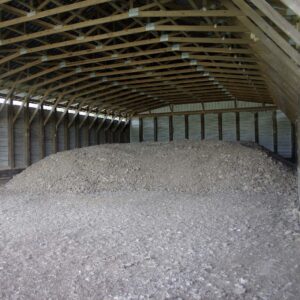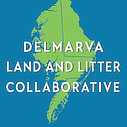Litter Storage
 Storage sheds are required by poultry growers to store litter after it is removed from the house. However, once the sheds are full, poultry growers are eager to sell the litter to crop farmers. Though research has demonstrated that properly sited litter piles in the fields do not impact water quality, growers who use litter for fertilizer prefer storage sheds so that they can receive litter year-round and store it until it can be applied to the fields.
Storage sheds are required by poultry growers to store litter after it is removed from the house. However, once the sheds are full, poultry growers are eager to sell the litter to crop farmers. Though research has demonstrated that properly sited litter piles in the fields do not impact water quality, growers who use litter for fertilizer prefer storage sheds so that they can receive litter year-round and store it until it can be applied to the fields.
The regulations around litter storage vary across Delmarva states. For example, Virginia farmers can only store litter in fields uncovered for 14 days, Delaware farmers are given 90 days, and Maryland farmers can store litter uncovered until the first spring following stock pile creation.
To better assist farmers and environmental protection efforts, DLLC and its partners advocated to make cost-share funding available for litter transport. Now, all three Delmarva states offer cost-share for litter transport.
In addition to our advocacy to expand storage cost-share programs, DLLC worked with the Delmarva Chicken Association, Sustainable Chesapeake, The Campbell Foundation, and the National Fish and Wildlife Foundation to develop and launch a litter-matching app. Littr connects poultry growers with litter, a locally sourced, organic, and slow-release fertilizer, with those who need it – from grain farmers to mushroom growers to alternative users and everyone in between.
